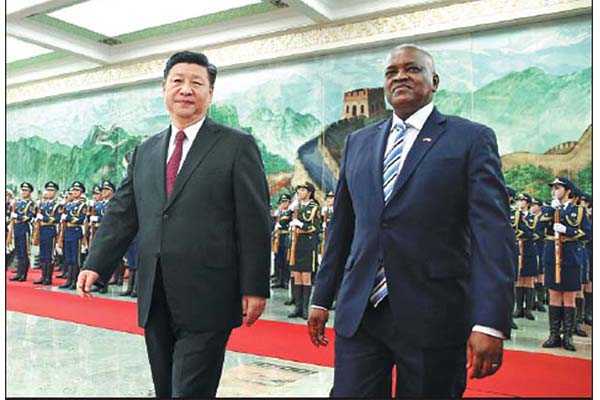Botswana-China Bilateral Investment Treaty in limbo
President Mokgweetsi Masisi has returnsl from his visit to Beijing, China, certainly a happy man, in light of the concessions he has extracted from his counterpart, Xi Jingping. According to official news reports China has extended some P340 million for Botswana’s development and on top of that, cancelled Botswana’s P80million debt. This is no small feat by any measure.
Masisi’s state visit has also calmed the frosty relations between China and Botswana, which erupted last year over a planned visit of Tibet’s spiritual leader, Dalai Lama to Botswana for a peace conference. The two nations’ cordial relations which were begun in 1975 by this country’s founding fathers were almost sullied by this single act, which China deemed offensive and against the spirit of the One China Policy, which Botswana has always respected. Masisi will announce in a press conference tomorrow 9Saturday 8th September) other concessions that he has made with the Chinese people across economic, social, cultural and political relations. A sticking point for most of the Asian investors has over the years been Botswana’s restrictive immigration laws.
Thankfully, Masisi has since committed to review the immigration policies with a view to relax visa and work permit requirements for investors, businesspeople and other foreign nationals visiting the country as either tourists or workers.Even though Botswana and China have signed Memorandum of Understanding on various areas of cooperation during the recent state visit, there is serious concern that the agreement on promotion and protection of investment between the two nations, which was signed in June 2000, has not entered into force.
Reasons advanced for this delay are that it is being withheld by “legal issues,” on the Botswana side, while China has already signed it and passed it through Parliament. In a recent interview before the delegation left for China, the country’s Chief Negotiator at the Ministry of Investment, Trade and Industry, Phadzha Butale expounded further on this.“Indeed we signed a Bilateral Investment Treaty (BIT) with China. Subsequent to that we found that BITs as previously crafted brought unforeseen problems and debilitating consequences for developing countries particularly in Africa.
“As a result, both nationally and regionally a decision was taken to review our template BIT and to come up with a suitable model that would be adopted in the region at SADC. Thus Botswana took the decision to impose a moratorium on the negotiation and commencement of BITs where same had been signed so as to allow for their review. The review is still underway and the moratorium still stands,” said Butale.
Trade value between Botswana and China is skewed in China’s favour. Li Hongbing, the First Secretary in the Economic and Commercial Counsellor's Office at the Embassy of the Peoples Republic of China in Botswana, says the trade value between China and Botswana was US$ 266 million. Chinese statistics show that in the same period, the outflow of foreign direct investment from China to Botswana dropped 77 percent year-on-year to US$ 18.78 million, while the amount of FDI from China to SADC was US$ 1.07 billion.
China’s main imports from Botswana were jewellery, precious metals and their products, mineral sand and ash; oil seed kernels, clothing and accessories. There is hope that China could relax her sanitary and phyto-sanitary (SPS) standards and lift the ban on Botswana’s beef exports to that huge market. Observers however, wonder whether Botswana would be able to supply that market with beef if this came to pass. It is food for thought, as Botswana explores alternative export markets in her quest to diversify her economy and bring poverty levels down.






